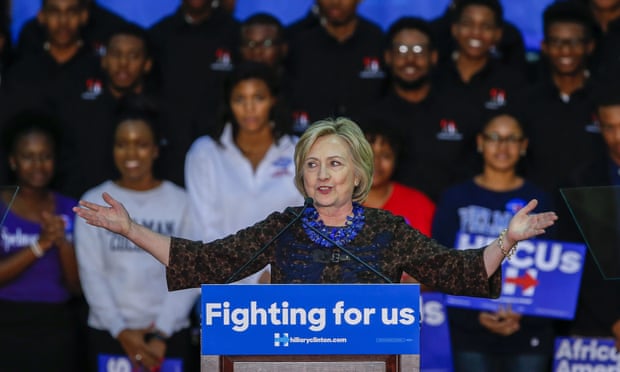Vowing to stand against systemic racism and injustice as president, Hillary Clinton took her criminal justice platform to the south on Friday while rallying black voters in Atlanta.
But moments into a campaign event where Clinton was set to unveil new proposals to reform the criminal justice system, she was interrupted by protesters from the Black Lives Matter movement who drowned out a lengthy portion of the Democratic presidential candidate’s speech.
Speaking from inside a packed gymnasium at Clark Atlanta University, an historically black university, Clinton initially acknowledged the group of less than a dozen protesters and responded by asserting: “Yes, black lives do matter.” But as they continued to chant and sing over Clinton, she was forced to carry on with her speech despite it being inaudible for a period of time.
It took the crowd of roughly 2,100 people, who had enthusiastically welcomed Clinton, to rally around her and drown out the protesters. The audience broke into chants of “Hillary! Hillary!” in an attempt to quell the interruption and when unsuccessful began shouting “Let her talk!”
The latter did the trick, as the protesters exited the room and Clinton was able to resume her speech.
The moment was emblematic of how criminal justice has emerged as a pivotal issue in the 2016 presidential race. The intent of Clinton’s event had been in part to call for an end to racial profiling by law enforcement officials amid simmering tensions between police and minorities – especially African Americans – across the US.
“I appreciate their passion and their urgency,” Clinton, who met with a group of Black Lives Matter activists earlier this month, said of the protesters. “I have some issues to discuss and proposals to make if our friends will allow me to do it. They may actually find them to their liking,”
Barring the disruption, which lasted for nearly 10 minutes, Clinton was enthusiastically received by the mostly African American crowd. Attendees had queued around the block to see the former secretary of state speak and frequently broke into cheers and applause, as Clinton insisted she was “just getting warmed up”.
“Race still plays a significant role in determining who gets ahead in America and who gets left behind,” Clinton said. “Racial profiling is wrong, demanding, doesn’t keep us safe or help solve crimes.”
“It’s time to put that practice behind us.”
The visit served as the first leg of a broader push Clinton plans to make on criminal justice, a theme that has been central to her campaign and was the subject of her very first public speech as a presidential candidate.
In addition to calling for legislation that would ban racial profiling by federal, state and local law enforcement, Clinton also backed a plan to eliminate the sentencing disparity between crack and powder cocaine. Her proposal would expand upon Barack Obama’s Fair Sentencing Act of 2010, which reduced the sentencing ratio for individuals found in possession of crack cocaine versus those with powder cocaine.
“We’re talking about two forms of the same drug it makes no sense to continue treating them differently. Let’s finish the job and fix this,” she said.
The basis of the distinction, a law passed in 1986, has long been perceived as discriminatory toward African Americans since the overwhelming majority of people convicted of crack cocaine possession in the United States are black.
Clinton, who earlier this year called for an end to the “era of mass incarceration”, also pledged to take executive action as president to “ban the box” in the federal hiring process. Under the action, Clinton would bar the federal government and contractors from including questions pertaining to criminal history in the initial application stage as a means of helping those who’d been incarcerated compete for work.
“It leads to repeat offenses. It creates a culture of hopelessness. People who have paid their debt to society need to be able to find jobs, not just closed doors and closed hearts,” Clinton said.
She was introduced by representative John Lewis, the home state congressman and civil rights activist who is backing Clinton in the Democratic primary.
“Hillary Clinton is without a doubt the most qualified person to be president of the United States,” Lewis said.
The audience roared in agreement.
Clinton’s Democratic opponents have sought to inject themselves into the conversation, issuing statements to contrast their own agenda for criminal justice reform.
Vermont senator Bernie Sanders and former Maryland governor Martin O’Malley both highlighted their support for abolishing the death penalty, which Clinton said earlier this week should be used in “egregious cases” while stopping short of calling for an end to capital punishment. Sanders further touted his support for lifting the federal ban on marijuana, pointing out that black individuals are four times more likely than white individuals to get arrested for marijuana possession.
Clinton did not mention either opponent in her own remarks, which she began on a reflective note about attending a speech by Martin Luther King Jr.
“His grace and moral clarity were compelling. I can feel it still today,” she said.
Earlier on Friday, Clinton attended a luncheon with local and regional leaders of the African American clergy and was introduced by another civil rights hero, the Reverend Jesse Jackson.
There, Clinton revealed her more spiritual side while speaking of a higher calling among those who have faith. Society, she said, should be founded on two simple principles: “To be kinder to each other and to love each other.”
“Maybe you can’t run for president on a love and kindness platform, but I’m going to try,” she said.


0 comments:
Post a Comment